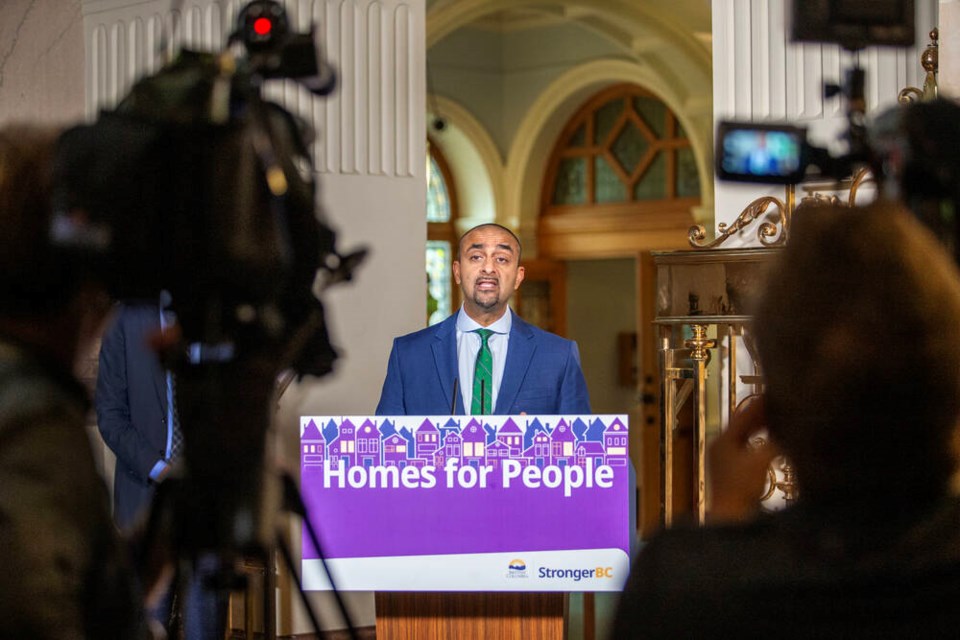Call them the Airbnb police.
Starting next spring, a new provincial short-term rental enforcement team will crack down on illegal Airbnbs, but if there’s lessons to be learned from municipal bylaws, it will take some online detective work to catch scofflaws.
The Short-Term Rental Accommodations Act, which is expected to come into force before the end of the fall legislative session, will ban most short-term rentals that aren’t in the operator’s principal residence, which means people or companies with multiple Airbnbs will have to list them as long-term rentals or risk hefty fines of $3,000 per infraction, per day.
The exception is for communities of less than 10,000 people and 14 resort communities including Tofino, Whistler and Osoyoos unless they choose to opt in.
Few details have been released about the budget or personnel assigned to the proposed enforcement team, which will begin looking for illegal short-term rentals when the rules take effect May 1.
But Housing Minister Ravi Kahlon said this week that the unit will be similar to the 10-person Residential Tenancy Branch’s enforcement team, which is led by former Victoria police superintendent Scott McGregor.
About 30 municipalities already regulate short-term rentals through bylaws and licence fees. Vancouver, Victoria and Kelowna limit short-term rentals to one’s principal residence, meaning the owner or tenant must reside in the home.
The problem is, according to B.C. Premier David Eby, “cities that want to deal with this problem have been trying to figure out how to enforce it.”
“Short of parking a bylaw enforcement officer out front of somebody’s house to watch people go in and out, or search through a website and try to match-up a dot on a map with a specific address and try to pair that up … you have to be basically a private detective to figure it out,” he said during a news conference Monday.
The B.C. NDP government’s fix is to create a provincial registry of short-term rentals, which will be up-and-running in late 2024. That registry can be cross-referenced with the province’s speculation and vacancy tax disclosure form which requires British Columbians to declare their primary residence, Kahlon said. That data will be shared with local municipalities to help them in their own crackdown efforts.
“This new legislation and the registry will create the ability to just spit out a printout of numbers, the business licences that they can match-up with the business licences on the (short-term rental) platforms, which will be legally required to co-operate with us,” Eby said.
In Vancouver, an estimated 40 per cent of the estimated 5,000 active short-term rental listings are breaking the city’s bylaws, which state that a short-term rental can only operate in someone’s principal residence, which includes a laneway house, basement suite or in one’s home or condo while they’re away on vacation.
Vancouver chief licence inspector Sarah Hicks wasn’t available for an interview but said in a statement that unlike the traditional “boots-on-the-ground” enforcement approach for bylaw infractions, the short-term rental enforcement team uses a data-driven model that relies on digital evidence.
The city’s team is comprised of eight staff — six enforcement clerks, one enforcement coordinator and one dedicated property-use inspector — who investigate complaints and review online listings using various sources including software called Host Compliance, which captures screenscrape data from multiple listing platforms. The team also reviews the data provided through an agreement with Airbnb.
“Staff proactively investigates illegal listings and has a variety of options to address suspicious listings such as conducting an audit or inspection, issuing a violation ticket or warning letter, and suspending a business licence,” Hicks said.
Short-term rental operators flouting the bylaws are subject to fines of up to $1,000 per offence and may be referred to the prosecutor’s office for legal action, she said.
Since Vancouver’s bylaws came into effect in 2018, the city has had 2,266 licences flagged for investigations, 136 so far this year. The city has written 1,712 warning letters — 85 in 2023 — and issued 1,040 legal orders, including 161 this year.
The city has issued 2,173 violation tickets since 2018 — 311 in 2023 — and 986 units were identified for inspection. A total of 204 listings were referred to prosecution and 1,367 business licences were suspended.
Bylaw officers in Victoria can barely keep up with the complaints about short-term rentals, said Victoria Mayor Marianne Alto. The City of Victoria has issued 346 fines worth $91,000 since the bylaw came into effect in 2018.
Bylaw officers are often required to do intensive detective work to prove a property is illegal, Alto said. In four cases, the city fought short-term rental owners in court, including one person who operated an Airbnb despite being denied a licence.
The city won all four cases, resulting in $20,000 in fines and court orders prohibiting five people from operating short-term rentals.
“We have significant investigations that have to happen when someone complains. They can lead to appeals, and that can lead to processes that involve council over months,” Alto said.
Alto said once the rules come into effect May 1, the City of Victoria can identify illegal short-term rentals, share that information with the province and the enforcement team will carry out the investigation. The enforcement team doesn’t replace municipal bylaw teams, rather Kahlon said the provincial team will collaborate with its municipal counterparts.
“Our enforcement team will be more focused on ensuring companies that are hosting these units have the proper registration number, that they’re following the rules, and we’ll work in collaboration with local governments,” Kahlon said Thursday. “So it could be a local government going to finding a property that they believe is not registered and taking action or it could also be us identifying something and going directly to the host to say, ‘You’ve got to remove this or else there’s a fine attached to it.’ ”




